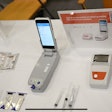Obtaining Joint Commission on Accreditation of Healthcare Organizations (JCAHO) approval can be a harrowing experience for a healthcare facility. But many radiology administrators and big-time insurers believe that the JCAHO's seal of approval may not be stringent or specific enough to meet radiology's quality needs.
Enter the Reston, VA-based American College of Radiology (ACR).
The nonprofit group offers accreditation in nearly every radiological modality, from mammography to ultrasound and MRI to PET. Although each modality comes with its own set of criteria, the ACR judges quality on basic overarching themes from staff qualifications to machine optimization and patient records to image quality.
"We would never think of not having ACR accreditation," said Shannon Gutierrez, director of radiology at North Texas Hospital in Denton, TX. "It's just an automatic part of running things."
Although the ACR's accreditation process has been around since 1963, Gutierrez said only three major hospitals in her geographic area have received accreditation, meaning that most others -- including outpatient and independent imaging facilities -- have not.
Even though North Texas Hospital maintains accreditation from the JCAHO, it also received ACR accreditation for MRI services last February. The facility sought accreditation partly because a major payor in its region requires it and partly because of what accreditation means for overall business and quality imaging, Gutierrez said.
Payment for quality
Several insurers require some type of accreditation, generally in MRI, CT, or PET for radiology reimbursement, said Leonard Lucey, legal counsel and senior director of nonbreast imaging accreditation for the ACR.
Insurers requiring ACR accreditation for MRI services include Aetna U.S. Healthcare, Blue Cross of California, and New York Medical Imaging, among others, according to a recent article on Auntminnie.com.
"Two to three years ago, there was a major push from third-party payors for radiology programs to have accreditation to qualify for reimbursement, but that has slowed down a bit since then," Lucey said.
A few state legislatures, including those of Connecticut and Rhode Island, require ACR accreditation of any physician who performs MRI imaging to ensure the quality of in-office MRI exams.
Accreditation choices
Although some radiology facility directors see ACR accreditation as a no-brainer, others slough off the college's process, citing JCAHO as the premiere accreditation body. Still others, such as Barbara Ana Perez, director of imaging and therapeutic services at Jackson Memorial Hospital in Miami, participate in both JCAHO and ACR accreditation and with other accrediting bodies as well.
Discerning which guidelines applied to which accreditation body used to be like playing pin the tail on the donkey, Perez said. But now the various standards essentially complement one another. For example, the JCAHO concerns itself with credentialing, patient flow and processing, patient safety, medication errors, and so on.
The ACR "takes it one step further," Gutierrez said. It examines film quality and resolution, and requires phantom testing and case analysis to ensure the accuracy and quality of each reading and therefore the quality of patient care, she said. And the ACR checks that technologists are certified and specifically trained on the machine that they operate, she noted.
"ACR examines the radiology department and has great expertise in that field," said Kurt Patton, former executive director of the JCAHO's hospital accreditation program.
The JCAHO looks outside of the radiology department to see how it interfaces with the rest of the hospital. The ACR looks more in-depth within the department, Patton said. The JCAHO does not claim to have expertise in clinical radiology, but it does have expertise regarding how radiology interfaces with other clinicians who rely on radiological services, he said.
The bottom line is that most hospital-based radiology departments will be JCAHO-accredited, but not all will be ACR-accredited, Lucey said. And although many freestanding facilities boast ACR accreditation approval, many more maintain only the minimum quality requirements specified by third-party payors or state and federal regulators.
But if Gutierrez had her druthers, both the JCAHO and ACR sets of inspections would be standard.
"They each offer different things," she said. "For me, a combination (would) represent the best of both worlds."
Paperwork and other problems
The most difficult part of handling any accreditation process -- whether by the JCAHO, the ACR, or another accreditor -- is the sheer volume of an operation. At least that's the case for Perez and her counterpart Joan Maddix, radiology quality assurance manager at Jackson Memorial.
With more than 300 full-time employees, ensuring that everyone follows proper protocol takes organization and communication skills. So on every payday, employees receive a JCAHO newsletter. In the newsletter, Maddix places JCAHO facts and patient safety tips along with other relevant information.
At Jackson Memorial, a special committee examines best practices for administering medications. Radiology administrators complete monthly dashboards about incident reports, patient safety, and the like.
"With a department this size, sharing information is vital," Maddix said.
To make matters more difficult, the department isn't yet a digital entity, although it plans to be 100% electronic with a complete RIS update later this year.
"It's a slower process not being digital," Perez said. "But I have to give this department credit; the amount of follow-through is wonderful. Everything here has a paper trail. We're in line with all the qualifications. But being digital will make it that much easier."
The cost, time, and organization associated with accreditation processes worry Gutierrez.
"The process takes a long time, and we have to wait to gather all the appropriate scans (that) ACR requires," she said.
For example, North Texas Hospital completes many neurology scans, but not many knee exams. The ACR wants to see competencies for every variable on a given modality -- in this case, an MRI, Gutierrez said.
The process has to be completed within two weeks unless the facility applies for an extension. North Texas Hospital obtained an additional two weeks for its knee exams.
Fortunately, Gutierrez and her staff were able to complete all the ACR paperwork during normal working hours, thanks to their combined experience and built-in quality training and assurance programs.
"Some facilities have a difficult time getting through the process, especially their first time," she said. "But we are fortunate to be adamant about quality control here. It makes the process a lot easier."
By Melissa Varnavas
AuntMinnie.com contributing writer
June 13, 2006
This article originally appeared in the "Radiology Administrator's Compliance & Reimbursement Insider," a monthly newsletter published by HC Pro that is designed specifically for radiology administrators. For a free trial subscription, please click here.
Related Reading
Unlock success with strategy, research, April 27, 2006
Preparing for a JCAHO visit, April 18, 2006
Dealing with HIPAA changes in 2006, April 6, 2006
ACR criteria cut imaging costs in Israel, January 11, 2005
Nation's largest insurer to adopt ACR criteria, accreditation, December 9, 2004
Copyright © 2006 HC Pro



















